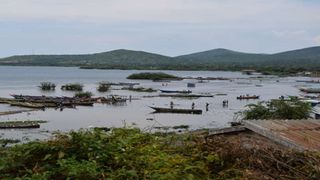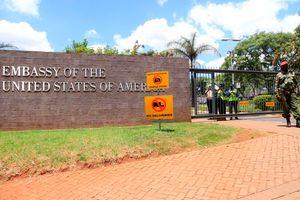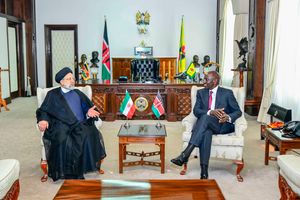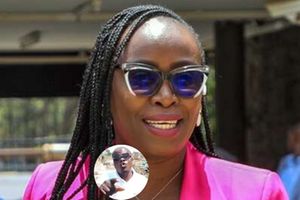
Wadiang’a beach in Sindo, Homa Bay County.
Homa Bay
Premium
Islands of misery: In Homa Bay, teachers live in penury
Makeshift classrooms welcome you to Kibuogi Primary School in Suba Sub-County of Homa Bay.
It has 161 pupils, including 28 Kenya Certificate of Primary Education (KCPE) candidates, who will travel to the mainland in Sindo to sit their exams because the school is not a registered centre.
Learners share classrooms, which makes concentration a huge challenge. Those in Early Year Education (EYE), Grade One, Two and Three are the most affected. Their classrooms have neither doors nor windows and the floors are covered with dust.
Grade Three pupils learn in a structure with only two sides, making it difficult to distinguish between the entry and exit points. Learners and teachers have to bear with harsh weather conditions.
At the Pre-Primary 2 (PP2) classroom, half of the pupils are seated on a reed mat while the rest are distributed on the few available desks.
A tutor, identified as Ms Jane, teaches PP1 and PP2 pupils. She has strapped her baby on her back while a toddler is playing nearby. The dilapidated classrooms depict the struggles that Kibuogi residents go through.
All islands around Lake Victoria are classified as hardship areas, though teachers at Kibuogi do not receive the allowance. They are Ringiti, Remba, Takawiri, Mfangano, Ndhodhe, Kibuogi, Rusinga, Kiwa and Sukru islands.
Here, folks live each day at a time. For them, access to basic needs such as food, education and electricity is a challenge. They have no access to clean drinking water either.
Mr Alfred Opiyo, the head teacher at Kibuogi, said the institution was started in 1980, but the government has never addressed their problems.
Digital literacy materials that were provided by the Ministry of Information Communication and Technology are yet to be used.
Electricity is so expensive that in a recent visit by chief administrative secretary Sarah Ruto and Basic Primary Principal Secretary Julius Jwan, teachers handed over a hand-written memorandum because they could not print it out.
The school relies on solar energy but since their power inverter broke down, digital materials have never been used. “Digital learning is a mirage. The materials are there but they have never been used,” Mr Opiyo said.
Most of the islands are rocky and hilly. Kibuogi has a huge population of birds and residents have gotten used to the noise and their droppings that have turned all vegetation in the island white.
To access the islands, one has use either a water bus, a boat or small ferries; a treacherous journey that needs careful planning and discipline. Some islands are so isolated that communication on mobile phones is difficult because of poor network.
To call, send a text message or use the internet, one must find a specific position to get the signal. Buying of groceries, stationery and other basic items is a problem.
Building and construction is also a challenge since cement and iron sheets are only sold in the mainland. It costs Sh1000 from Kibuogi to the mainland, so unnecessary movement is limited, except when going to hospital.
All teachers live in the school compound. “Most learners who go home for lunch don’t come back to school. They have to walk for several kilometres before getting to class,” said Mr Opiyo.
“We would also like to benefit from the school feeding programme to attract more leaders. Most of the children miss school because they do not have anything to eat. We are also calling on the government to consider constructing a secondary school here to ease transition,” he added.
Dr Ruto promised additional classrooms.
Suba North MP Millie Odhiambo urged residents to use public ferries when moving between islands. Most transport services are provided by private firms that manage ferries and water buses. There are also individuals who operate passenger boats, but these are commonly used in small islands.
“My office, through the National Government Constituency Development Fund (NG-CDF), will try all it can to improve infrastructure in school. We are, however, asking the government to support us in making transport less expensive,” the MP said.
Mr Joshua Owuor, a member of the Suba Council of Elders representing Mfangano Island, said absence of secondary schools means some learners drop out after KCPE.
“Most parents normally take their children to live with their relatives in a different island where there is a secondary school. In circumstances where parents do not have relatives, learners are told to go fishing instead of continuing with their studies,” he said.
Mbita Deputy County Commissioner Abraham Kemboi added: “The government should consider giving schools in the islands more funds because they have special challenges, such as the cost of transporting materials.”






